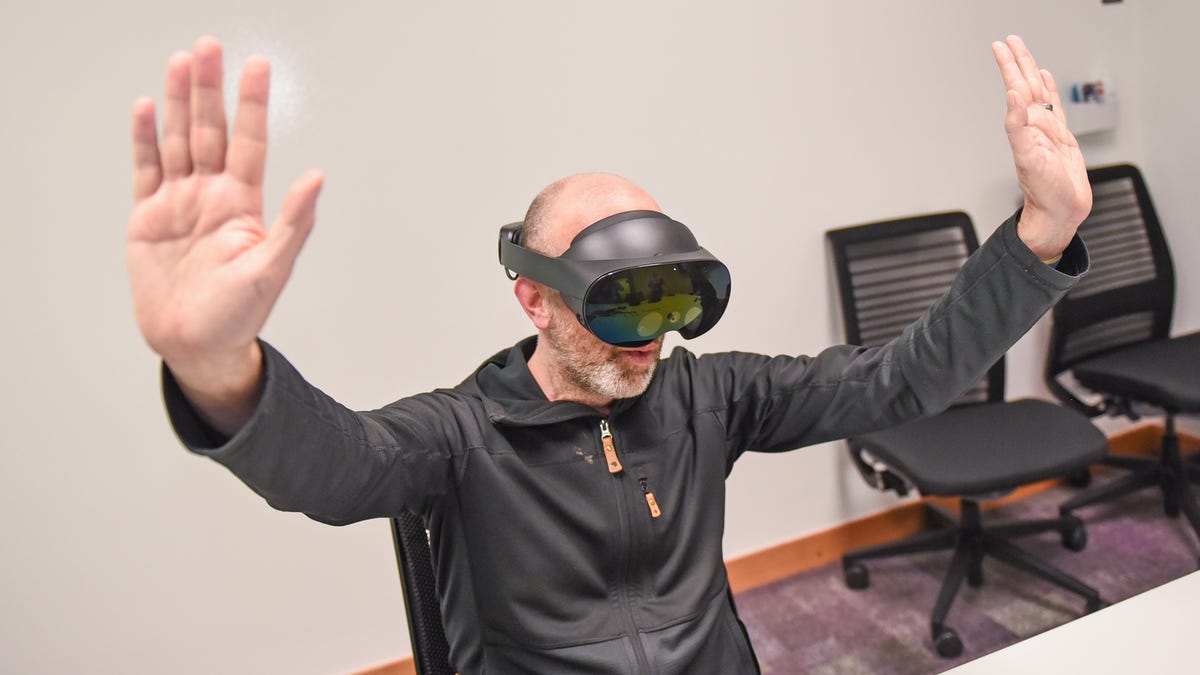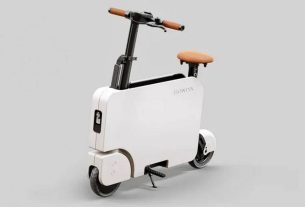High fiving my way around the metaverse.
I’m sitting in a beach-side office, chatting with business journalists and some of Meta’s technology experts. A few minutes earlier, I’d been with the same group looking out the window onto what looked like a futuristic version of San Francisco.
Welcome to the next-generation workplace — or at least Meta’s version of it. At the company’s office near King’s Cross in London, I recently got to try out the firm’s latest technology, the Meta Quest Pro, and a series of related features, known as Horizon Workrooms.
Meta says the Quest Pro is designed “specifically” to spur new levels of creativity and collaboration in the workplace. While a lot of the focus on the metaverse so far has been on consumer-facing deployments, whether that’s gaming, virtual shopping or collecting NFTs, Meta’s keen to highlight how the Pro is a step forward in another direction: enabling the workplace of the future.
Also: Meetings in the metaverse: Our experience with HTC Vive Sync
Steve Hatch, VP Meta Northern Europe, says every organization knows the ability to work in more flexible ways is key to success — and emerging technology can help ensure hybrid workers in all locations feel happy and included.
“Where this starts from — and the work that we’re doing here — is how do we make the best possible experiences for people and for companies? The heart of that really is about inclusion and about having a working environment that works for everybody.”
Is this the future of work? Image: Meta
Meta unveiled new research at the event, which suggests most employees (81%) want to work in collaborative environments, but just 16% believe video calls help them feel present in meetings, and only 14% think these calls lead to greater collaboration with colleagues.
More than half (59%) of UK employees feel the metaverse could help fill this inclusion gap, replicating the sense of togetherness that comes from working in an office.
“That’s a pretty high stat,” says Hatch. “People working in organizations are saying, ‘we think there’s something here that we’re interested in, we want to explore it more and we think it can solve a problem.'”
Meta’s solution — the Pro handset — debuted at the start of October and includes eye-tracking technology, which aims to make natural expressions and expressiveness in the metaverse more accurate, and full-color mixed reality, which aims to create a more effective interplay between digital and physical environments.
Also: Now you can join a Microsoft Teams call from a HoloLens 2 headset
Unlike the thick Fresnel lenses and displays in the earlier Quest 2 headset, the Pro uses Pancake optics that provide 75% more contrast, 33% more pixels per inch in resolution, and a 40% slimmer profile. Add in new controllers, which include a modular stylus tip at the bottom that works like a virtual marker on whiteboards, and what you get is a completely revamped virtual experience, says Meta.
So, what’s it like? Well, like all VR technologies, there’s a bit of acclimatization required when you first use the headset, especially if you’re a metaverse newbie like me.
At one point in the demonstration, I was using my fingers to pinch and point at the menus at the bottom of the screen, and I accidentally used the ‘swap seats’ function, jumping across the room to a different position.
Pinching and zooming to a new location.
Unexpected teleportation aside, once I’d familiarized myself with my online surroundings, it was surprising how quickly I was able to get used to being in the virtual office.
I didn’t find the headset to be particularly heavy and the spatial audio, which allows you to follow who’s speaking, was crisp, clear, and effective.
When you’re in an online space with others, it’s easy to use the Pro to interact with people and to keep track of conversations.
Yet while the sound and visuals are sharp and well-defined, anyone hoping the Pro is a massive step to what many experts think will be a metaverse that seamlessly blends physical and virtual environments is likely to be disappointed.
For this user at least, using the nascent collaborative workspaces is still very much a distinctly virtual experience.
Using the Pro to interact with other people felt similar to playing an online game — one that’s a bit like The Sims, but none of the characters have legs and everyone is sitting politely at their desks.
My lack of virtual smarts probably made the experience feel stranger. Plus, I only used the headset for about 10 to 15 minutes, so it would be unfair to give a full review of the product.
What I did get to try out — and enjoy — were some of the Horizon Workrooms features that Meta hopes will usher in a new era of enterprise collaboration.
Flexible rooms allow users to select different types of space for work — from breakout groups for brainstorming to presentation rooms — that expand as more people join the meeting.
Also: Metaverse and immersive experiences: How one company is getting started on the journey
You can also customize your meeting environment, whether that’s an office at the beach or a futuristic bay-like location, and then modify your avatar to suit your mood and personality.
Back in reality, I explained the demonstration to my eldest daughter who said the whole virtual workplace experience sounded “a bit like Animal Jam for businesspeople”.
For the uninitiated, Animal Jam describes itself as a safe, online playground for kids, where you can personalize your character, chat, play mini-games, and learn fun facts.
Personalization is certainly a big thing in Horizon Workrooms and all the journalists at the demo had a go at high fiving each other and drawing silly pictures on the persistent whiteboard, so there’s certainly an element of gamification.
Meta’s team at the event told me that some major organizations are beta testing the tech giant’s products right now.
It will be interesting to speak to executives at these organizations and find out whether the technology is really helping to fill the inclusion gap for hybrid workers.
For now — and as some of my colleagues also discovered recently when using HTC Vive Sync — meetings in the metaverse remain a niche and rather expensive business pursuit.
To expand its own efforts in the virtual workspace, Meta is working with Microsoft, Accenture, and others.
Hatch says these partnerships are important, as the metaverse — despite Meta’s well-publicized investment into the technology — will not be built by one firm in isolation.
“Our prediction is increasingly you will see what would normally perhaps be described as competitive companies working really closely to build this metaverse together,” he says.
“It’s going to be tens of hundreds — if not hundreds of thousands — of organizations that build this space together, many of which probably don’t even exist yet.”



